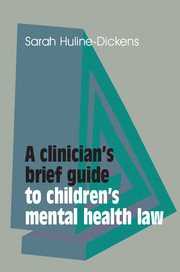Book contents
- Frontmatter
- Contents
- Foreword
- Acknowledgements
- List of cases
- Common abbreviations and terms
- 1 Introducing child mental health and the law
- 2 The rights of the child
- 3 The Children Act 1989 and the 2004 amendments
- 4 Consent to treatment
- 5 Confidentiality
- 6 The Mental Health Act
- 7 The Mental Capacity Act
- 8 Juvenile justice
- References
- Index
7 - The Mental Capacity Act
Published online by Cambridge University Press: 02 January 2018
- Frontmatter
- Contents
- Foreword
- Acknowledgements
- List of cases
- Common abbreviations and terms
- 1 Introducing child mental health and the law
- 2 The rights of the child
- 3 The Children Act 1989 and the 2004 amendments
- 4 Consent to treatment
- 5 Confidentiality
- 6 The Mental Health Act
- 7 The Mental Capacity Act
- 8 Juvenile justice
- References
- Index
Summary
The Mental Capacity Act 2005 (MCA) became law in England and Wales in April 2007. It is an Act applying to anyone over the age of 16 who lacks capacity to make decisions for themselves about matters concerning their welfare, finances or health.
Although the Act is widely seen as ‘inclusive and patient-friendly’ when compared with the Mental Health Act (Jackson, 2013: p. 289), the sections relating to the Deprivation of Liberty Safeguards (DoLS) and the new Schedules have had a very different reception. These were introduced by an amendment to the Mental Health Act in 2007, and came into effect in 2009. For example one senior judge, Lady Hale, wrote:
‘It is not just the length of the Schedules which makes them so impenetrable, but their obscure language, their relentless over-specification of detail, and their convoluted structure which makes it impossible to find the answer to any question in any one place’ (cited in Jackson, 2013: p. 310).
The MCA created a new Court of Protection in England (there was prior to this a Court of Protection existing as part of the Supreme Court). The Court of Protection makes decisions about the personal welfare and financial affairs of people who lack capacity.
Although the MCA as a whole is held in high regard – according to the House of Lords Select Committee's post-legislative scrutiny report (House of Lords, 2014) – considerable problems have been acknowledged with it. These include much misunderstanding of the Act, little ownership of it and poor implementation. The DoLS in particular attracted so much criticism that the Committee thought the only recommendation they could make was to ‘start again’. Jones, in the preface to the sixth edition of his Mental Capacity Act Manual, is highly critical and highlights a particular concern that case law developing from the DoLs is rendering the notion of liberty meaningless (Jones, 2014: pp. v–vi).
The difficulty for clinicians in child mental health is that this Act adds a layer of complexity to the other legislation to be considered, namely the Mental Health Act 1983 (as amended in 2007) and the Children Act 1989 (as amended in 2004), without offering clear guidelines about what to do when a young person's treatment might involve a deprivation of liberty.
- Type
- Chapter
- Information
- A Clinician's Brief Guide to Children's Mental Health Law , pp. 92 - 107Publisher: Royal College of PsychiatristsPrint publication year: 2016

